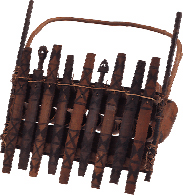African Music History
From the 15th C onwards, our history of music making in Africa is mainly derived from studying representations of dances and making music with African musical instruments and scenes depicted in terracotta, stone or metal.
In Ife, Yorubaland we see footed cylindrical drums dating from the 10th to 14th century on terracotta artefacts.
In Benin, pressure drums appear on brass plaques from the 15th C onwards. These plaques have proven to be a never-ending supply of information on the use of instruments like horns, bells, drums and bow lutes in ceremonial occasions.
In real form, the iron bells excavated in Katanga province, Congo and the Zambezi Valley of Zimbabwe are some of the earliest actual African musical instruments found, also dating around mid/late 15th C.

Kalangba xylophone, Tervuren museum
Migrations of tribes, movement of slaves and colonial porters and servants have all contributed to the wide dispersement of African musical instruments.
For example, lamellaphones with metal keys were a prominent feature in ancient Zimbabwe and spread through neighbouring kingdoms to Katanga and Angolan cultures, all the while becoming smaller and smaller for travelling purposes.
Zimbabwean 'mbiras' (lamellaphone) and 'ngomas' (drums) were first written about by Father Joao dos Santos, a Portuguese who travelled through the lower Zambezi in 1586 and recorded his impressions of the sounds these instruments made and the effects they had on their combined audience.
Historically, Africa has contributed hugely to music-making in many other areas of the world most notably the Americas and most significantly in genres such as jazz, rock and roll, blues, salsa and samba. Music once considered "primitive" by Westerners is now highly respected for its rhythmic sophistication and complexity.
Caribbean Musical History
Caribbean Musical History
The Origin of Calypso
Calypso rhythms can be traced back to the arrival of the first African slaves brought to work in the sugar plantations of Trinidad. Forbidden to talk to each other, and robbed of all links to family and home, the African slaves began to sing songs. They used calypso, which can be traced back to West African kaiso, as a means of communication and to mock the slave masters.
Trinidad was colonized by the Spanish, received large numbers of French immigrants, and was later ruled by the British. This multi-colonial past has greatly impacted the development of calypso in Trinidad. Many early calypsos were sung in a French-Creole dialect called patois ("pat-was"). These songs, usually led by one individual called a griot, helped to unite the slaves.
Calypso singing competitions, held annually at Carnival time, grew in popularity after the abolition of slavery by the British in the 1830s. (It was the French who brought the tradition of Carnival to Trinidad.) The griot later became known as the chantuelle and today as the calypsonian.
The History of the Diddley Bow
The diddley bow may have been the first instrument that produced the sound of sliding rhythm and the whines and cries of a single string that later became the distinctive sound known today as the "blues". It was common to the rural south in the 1800's and was made by stretching a piece of broom or cotton wire around two nails and a bottle or snuff can wedged under the wire to create tension for pitch. The string was plucked while sliding a piece of metal or glass on it to produce notes.
Simple Diddley Bow (with tuning heads)
Cigar Box Diddley Bow
Simple Diddley Bow (with tuning heads)
Robert Johnson, B.B. King, Muddy Waters, Albert King, "One-String'' Jones, Jesse Mae Hemphill, Elmore James, Pinetop Perkins, Lightnin' Hopkins, Son House, Charlie Patton, John Lee Hooker, Big Bill Broonzy, Mississippi John Hurt, Jimmy Reed, Luther Allison and Lonnie Pitchford are a few of the blues people that have played diddley bows.
As stringed instruments evolve especially under electrification, expect this topic to be revisted many-a-time. :-R



No comments:
Post a Comment